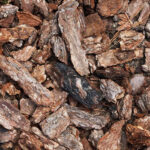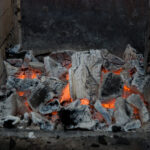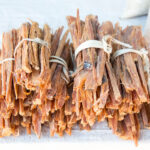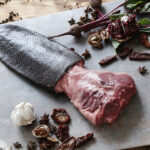Deer meat or venison surely gives you the much-needed protein fix. It contains more protein per gram than other red meats and is packed with several other nutrients to keep you healthy. The catch, though, is that venison also leaves many people feeling gassy after a hearty meal.
Our bodies have a hard time processing meats, mainly due to the protein. Since venison contains more protein than other meats, you might feel extra gassy after consumption. Protein digesting capacity varies from person to person, so some people feel gassier than others after eating venison.
If you are worried about the gassy feeling after a big venison meal and wonder whether it is safe and worth it to eat, keep reading. I’ve been hunting and eating venison my entire life, and I’ve done a lot of research on this topic.

Table of Contents
- Why Does Venison Make Me Fart?
- Can Deer Meat Cause Stomach Problems?
- Does Deer Meat Give You Diarrhea?
- How Can You Avoid Feeling Gassy After Eating Venison?
- Venison’s Main Components
- Final Thoughts
Why Does Venison Make Me Fart?
While many quickly point to protein as the main culprit to your farts after eating venison, it is not just the protein itself that causes the farts.
Protein is one of the reasons venison makes you gassy. However, your gut also takes longer to digest venison protein, so much so that it stays in your belly much longer, creating more of that nasty gas in the process.
However, note that the digestive system’s capacity to process what we eat varies from person to person.
Some people have more resilient guts and can digest tougher foods easier, leading to less gas. At the same time, others are not so lucky.
One thing is for sure, though: Whenever you eat venison or any red meat for that matter, you will most likely have smellier farts. This is because of the high concentration of methionine in red meats.
Methionine contains sulfur, which produces hydrogen sulfide when gobbled up by the bacteria in your gut. This is the compound commonly described as having that “rotten egg smell” in every science class.
So the next time you eat venison, remember that it doesn’t necessarily make you more flatulent; it just means you’ll have to deal with nastier farts.
Can Deer Meat Cause Stomach Problems?
Deer meat may cause gastrointestinal symptoms such as excessive gas, diarrhea, or nausea, especially in those who are sensitive to meat. Venison contains large amounts of methionine, which is a central component of explosive and smelly farts.
Game meat mainly contains higher amounts of this chemical, so it’s not very surprising that you release gas that smells like a rotten egg after a quick yet large venison meal.
However, the good news is that this is not necessarily a health concern, especially in the short term.
Flatulence may simply be a hint that you need to tweak some of your eating habits, especially the speed at which you consume protein-rich foods in high amounts.
You may also want to pay attention to your gut health to minimize flatulence, as a healthy gut allows for the production of beneficial enzymes that aid the body in digesting faster.
While your teeth promote the mechanical grinding of food, these digestive enzymes lead to further chemical breakdown.
However, you may have to pay attention to flatulence in the long term, as this could mean that your digestive system fails to digest effectively, no matter what you eat. The problem does not necessarily lie in eating venison itself but in the system that digests it.
Does Deer Meat Give You Diarrhea?
Eating venison is generally considered very safe. There are, however, some things to consider before consuming deer meat.
Venison contaminated with E. coli can cause diarrhea in humans. When preparing venison, sanitize surfaces, utensils, and wash your hands. Those with meat allergies or other health concerns may be more susceptible to adverse effects after eating contaminated deer meat.
Fortunately, venison processors are required to get a processing license, although regulations generally vary from state to state. This means that a standardized procedure of screening deer meat takes place before it reaches the market.
Venison is also strictly labeled according to type, and only retail-quality venison is legally sold in the United States. Venison derived from private hunting expeditions can only be processed for personal consumption.
To further ensure consumer safety, these licensed processors are required to refuse to take in venison that does not look clean or that appears spoiled, damaged, or contaminated during transport from the hunting to processing.
So, if flatulence from eating venison gets you wondering whether it is indeed safe, don’t worry. The regulations in place to keep venison that reaches the market safe to consume will effectively protect you from serious concerns.
Taking proactive measures to help your digestive tract is the best way to avoid worrying over flatulence from a venison-derived meal, so there’s no need to ditch your favorite venison dish out of safety concerns.
How Can You Avoid Feeling Gassy After Eating Venison?
Eating venison or any other protein-rich meat challenges our digestive system to function more efficiently than it usually does, as it is more difficult to break down protein. Hence, the best way not to feel gassy when eating deer meat is to consume small proportions.
Even a tiny portion of venison already consists of huge amounts of proteins, fatty acids, and different types of vitamins, so nutrient-wise, you do not need to consume venison in huge amounts.
When eating venison, chew food properly to ensure that a substantial extent of mechanical digestion already happens in the mouth to prevent gassiness. Chewing the food properly also allows you to savor the flavor of the meat, making it even more delicious.
It will also help if you eat food more slowly. Not only does this allow you to mechanically break down food using your teeth and take the weight off your lower digestive system, but it also minimizes the density of food coming in at once.
This regulated flow allows your digestive system to function a little more optimally.
When you feel gassy after eating venison, chances are you also feel tired. This is because your digestive system is exerting so much effort to work on breaking down venison into manageable components.
In addition to the venison meat itself, retaining too much fluid in the digestive tract increases your likelihood of exhibiting flatulence. The state of your gut is also a major driving factor in preventing that gassy feeling,
If this is the case, eating healthy foods, such as leafy vegetables and fresh fruits, can help aid your digestion. The suitable types of healthy foods can assist in regulating fluid retention and improving your gut health.
This way, even if nibbling becomes binge-eating, you are still able to significantly reduce your chances of feeling glassy after a hearty venison meal.
Venison’s Main Components
If you only fancy venison because of its flavorful taste, then you’re up for a great surprise. Venison is packed with vitamins, minerals, and protein, which you should also look for in food aside from taste.
Like all red meats, venison contains high amounts of B vitamins, which help increase brain function and energy to keep you more active.
Venison also has a high amount of iron, an essential mineral that helps boost your hemoglobin production and keep healthy blood flowing in you.
Compared to beef, venison is much leaner. The total fat in one ounce of venison is only one gram, much lower than beef (five grams of fat in one ounce of beef). Meanwhile, the saturated fat in venison is only 17% that of beef.
Lastly, as mentioned earlier, venison is an excellent source of protein. A three-ounce serving of this meat contains 24 grams of protein and is only 96 calories. This makes venison an attractive protein-rich chunk of meat minus the calories.
Final Thoughts
It’s totally normal to get a bit gassy after eating venison. This is just your body breaking down the protein-rich meat. Try drinking a full glass of water to help with the digestion process.
Nothing tastes as good as the game you’ve harvested yourself. And remember, venison is packed with vitamins and minerals!
Thanks for reading.
You May Also Like: Can You Refreeze Venison After It’s Thawed Out?






